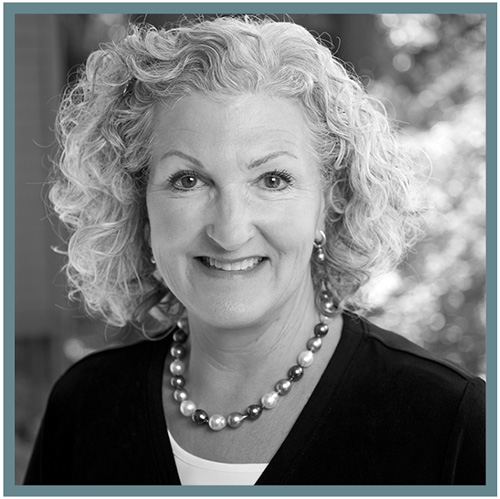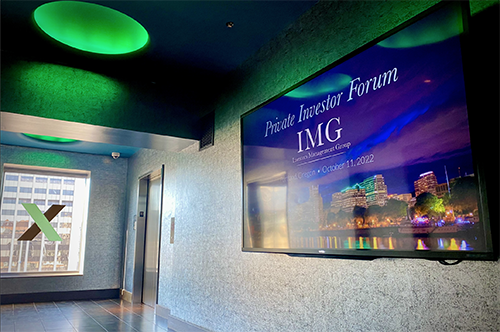News
IMG economic forum forecasts continued resiliency in multifamily

Industry-leading experts agree ‘it won’t be an easy time’, but forecast continued resiliency in apartments
Woodland Hills, CA— October 12, 2022— Investors Management Group, Inc. (IMG) brought together three of the nation’s leading experts in real estate investment and lending at an invitation-only Private Investor Forum at Xport Rooftop in Portland, Oregon.
Karlin Conklin, IMG Principal, Co-President and COO, led the investor-focused discussion covering timely issues such as inflation, leverage, cap rates and returns. Conklin opened the forum with the question, “We had the ‘The Dot Com Bubble,’ the ‘Great Recession of ’08’, and the ‘Pandemic of 2020’… Is there even a name yet for this current cycle we’re in?”
Looking at the Big Picture
“The system is shocked by the major run-up in rates, and the market needs to settle,” panelist Phyllis Klein, Senior Vice President, Head of Agency Production at Capital One, emphasized. “Multifamily is still the shining light in real estate with strong occupancies and future growth on the horizon. There are some clouds, but nothing like other cycles, and- frankly- this cycle was overdue.”
Fed policy is a blunt instrument, and the lag from when a rate hike occurs to when it is fully felt by the market is 12-18 months. “We’re all a little scarred from the Great Recession and haven’t absorbed the lesson that recession doesn’t necessarily equal apocalyptic doom,” explained panelist Josh Bodin, Senior Vice President, Head of Securities Trading at Berkadia.
Panelist Neil Schimmel, IMG Founder & CEO, commented that there is “certainly a correction in pricing ahead.” He expects transaction volume to remain cool through Q1-2023, then begin to pick up. “We’re seeing a disconnect between buyers and sellers at the moment because interest rates have risen so fast.”
“Cap rates are beginning to adjust to where the Fed is headed. Interest rates of 6%+ don’t fit with pricing at cap rates sub 4%. Sellers are trying to sell into a growth story, but some markets are moving backwards,” added Klein.
Macro vs Micro Trends
To understand the overall resiliency score of an investment portfolio, Bodin stressed the importance of moving away from rent growth and other data reported at the national level, and instead focus on hyperlocal/micro geographic and demographic trends.
Klein and Schimmel added insights into which U.S. metros still have the confidence of agencies and investors. “Vegas is entertainment. Orlando is tourism. Austin is tech. These markets don’t have the economic diversification as, say, a Dallas or Phoenix,” said Klein.
“We look for properties that fit with our IPA strategy: Intrinsic value, Price per pound, and Affordability,” said Schimmel, adding that markets such as Raleigh, Atlanta and Seattle have the economic diversification that results in a robust population and multifamily climate.
Klein also explained that lenders analyze credit card data to understand consumer behavior as it impacts market and housing trends. “Where are people spending their entertainment dollars? Who bought a U-Haul to move from point A to point B? We can harness this kind of data for the future.”
Rising Rate Environment
For years, average rents have been rising faster than inflation and wage growth.
“National multifamily rent growth is moderating,” according to Klein. “Aug 2021 to August 2022, we saw 10% growth. July to August 2022, zero rent growth. From the start of the pandemic to present, we had a 22% increase in rent growth. We expect the economy and multifamily industry to continue their stellar growth, but at a more moderate pace.”
“I see average rent growth around 1% higher than inflation,” Bodin projected. “And the long-term inflation average is 3-4%.”
Bodin also sees the Federal Reserve taking an aggressive approach to rein in inflation. In the past, the Fed has generally balanced its rate approach to hit targets for inflation and unemployment. But today, he explained the Fed is “looking almost exclusively at inflation. This is why the Fed has raised rates so high, so fast.”
Between March 2020 and March 2022, the Fed Funds rate hovered near 0% before spiking to a current level near 3.25%. No one believes that rates have topped out, with the broader consensus estimate for peak Fed Funds rate is 4.5% – 4.75% in 2023. Some experts predict the rate going to 5.0% in 2023 before trending down in 2024.
The Fed’s goal in raising rates is to encourage saving while discouraging borrowing and spending to slow inflation. The Fed Funds rate is fundamentally tied to the cost of borrowing through credit card debt, home loans and other financing. As an example, mortgage rates are set at approximately 3% above the Fed Funds rate. Earlier this year when the Fed Funds rate was near 0% and mortgage rates were near 3%, a buyer on a $2,500 budget could afford a $517,000 home. At a 6% mortgage rate, the same buyer could afford a $400,000 home.
A ‘Reset,’ Not A Deep Recession
As Conklin pointed out early in the panel discussion, “No one here has a crystal ball, and it won’t be an easy time. With that said, we’ve all been through this before. We’re prepared for the ‘known unknowns’ ahead.”
According to Bodin, we are moving into a garden-style recession of unemployment increasing 1-2% to break the back of inflation. “Money can be made in the ‘known unknown.’ Look regionally specific. Balance your renter wallet share. Barring a black swan event – the unknown unknown – don’t fear the correction. It’s simply fixing ten years of easy money and bringing asset values in line with normal monetary policy.”
Klein also offered investors some reassurance noting that multifamily, from both the agency and owner/investor perspectives, offers a strong hedge against inflation. “As long as you’re operating in the right markets and have a smart asset management team in place, multifamily as an investment is a no-brainer.” Klein shared that agencies refer to the current phase of the economic cycle as a ‘reset,’ not a recession.
“The pandemic reminded us that market disconnects happen very quickly,” Bodin added. “What I find interesting is that, if you look back over the last several decades at some of the best sci-fi movies in pop culture, you’ll find that an eerie number of their predictions around technology and innovation came true. Consider The Jetsons, the famous ‘60s sci-fi sitcom. Ever noticed where they lived? In an apartment. If we imagine what the future might look like in another 100 years, I think we can all agree that apartments will still be a fundamental element of society.”
Schimmel remains optimistic as well. “I’m an opportunistic buyer through up and down markets. In the coming year, there will be good buying opportunities, especially as sellers need to recapitalize. You’ll never see our team sitting on the sidelines.”
He pointed out that IMG’s disciplined due diligence and underwriting process helps his investor group avoid risky properties and risky markets. “It sets investments up for predictability.”
Conklin agreed, noting that “you’re seeing high leverage loans on properties right now,” referencing bridge loans and other creative financing that became popular following the COVID-19 market disruption. “IMG won’t take on that risk. Lower-leverage Freddie and Fannie loans are the safest debt you can get.”
“What the agency lenders are targeting is exactly what IMG acquires and operates,” Klein concluded. According to the FNMA website, more than 90 percent of the apartments Fannie Mae finances are ‘workforce housing’ and are “affordable to families earning at or below 120% of the area median income (AMI) – the teachers, first responders, and service workers who are an essential part of their communities.”
Closing remarks were given by Conklin, presenting IMG’s final 506(c) offerings for accredited investors in 2022. The firm’s two Atlanta metro apartment communities were nearly fully subscribed at the time of the Portland Investor Forum event.
“Our investors enjoy the discipline and predictability they get from our offerings,” said Conklin. “Neil’s favorite saying is ‘promised vs. paid.’ You can see from our track record, we would much rather under promise, and over deliver to our investors.”
ABOUT IMG
Since 2010, IMG has earned national acclaim for the predictable execution of multifamily investment and asset management across $1.5 billion in total transactions. Learn more →
Review our current investment opportunities →
OUR PANELISTS

Senior Vice President, Head of Agency Production
Capital One
Phyllis Klein is a critical member of the executive team for Capital One’s multifamily finance team responsible for the originations for Fannie Mae, Freddie Mac and FHA. Having been at the forefront of the multifamily finance industry for nearly three decades, she is an award-winning, nationally known resource and advocate for the originators and relationship managers she oversees.
Phyllis came to Capital One in 2019 after a remarkable 18-year career at Fannie Mae. As one of the Heads of Production, Phyllis managed borrower relationships, structured finance, and seniors housing in addition to marketing and communications for the Multifamily Division. Her record-setting achievements include leading the seniors housing business to an annual volume exceeding $5 billion.
Her prior experience includes serving as a political appointee under State Treasurer Phil Angelides heading the allocation of tax-exempt bonds for the State of California and holding a variety of executive roles within the Real Estate Group at Wells Fargo Bank and Union Bank.

Senior Vice President, Head of Securities Trading
Berkadia
Josh Bodin brings a wealth of knowledge in trading, economic analysis, and financial engineering from twenty years of experience in real estate finance and capital markets.
Mr. Bodin manages the capital markets activities related to Berkadia’s mortgage banking agency business including the management of loan pricing, trading, and investor relationships. He provides critical business analysis for Berkadia’s Fannie Mae DUS® and FHA lending programs. Mr. Bodin also oversees the economic analysis team providing real-time feedback on economic conditions.
Prior to joining Berkadia, he built and managed a Small Balance Lending Channel and traded a $6 billion-plus annual mortgage-backed security book for Capital One, traded the mortgage-backed security book at Beech Street Capital and managed the bond structuring role for Freddie Mac during their launch of the K-deal program.

Founder & CEO
Investors Management Group
Neil is highly specialized in the acquisition, management, redevelopment, and disposition of multifamily properties. He has completed over 500 separate real estate transactions totaling $4 billion dollars, which includes 40,000 units in 20 states.
Inspired by over three decades of work in multifamily, Neil established the IMG Los Angeles office in 2010 out of a belief that every property can be reimagined for good. Neil’s business philosophy is simple: when residents win, investors win.
MODERATOR

Principal, Co-President & COO
Investors Management Group
Karlin Conklin has specialized in leading companies and charting new industries and startups for over three decades. She has sourced, capitalized and helped in the repositioning of over 20,000 multifamily units raising nearly a billion in equity from institutional partners, Tenant in Common investors and high-net-worth individuals. She is a sought-after expert for a wide range of real estate investment publications and events including Multi-Housing News and GlobeSt.
Prior to founding IMG’s Portland office, Karlin held multiple high-powered positions in operations, sales and marketing. She was an award-winning multifamily broker for nearly 15 years generating nationally ranked annual sales volumes. In the 1990s, Karlin served as the Director of the Lindquist Center for Entrepreneurship at the University of Oregon where she earned an MBA degree, taught marketing and entrepreneurship courses and helped shape a new generation of business leaders.




